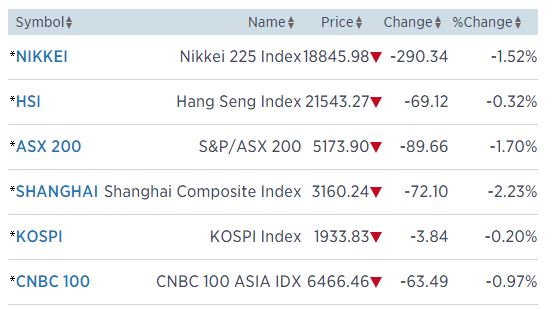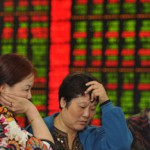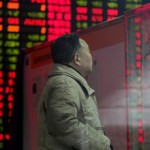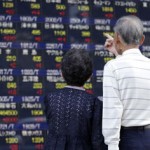Shanghai Composite widens losses as US futures tank
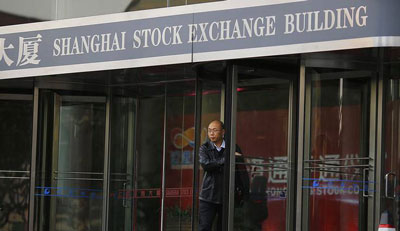
Mainland equities lost as much as 3.7 percent on Monday while Dow futures tanked more than 200 points on reports that Beijing may finally halt its controversial market intervention.
A report by The Financial Times over the weekend said that Beijing will abandon large-scale share purchases, sparking concerns over more declines for A-shares. Beijing may now switch its focus from intervention to stopping those it believes are “destabilizing the market,” the FT report said. Suspected state firm buying has propped up A-shares in recent sessions, resulting in two straight days of 5 percent rallies in Shanghai.
Fresh commentary from Federal Reserve officials also weighed on sentiment in Asia. Fed Vice Chairman Stanley Fischer told CNBC at the Jackson Hole symposium over the weekend that it was too early to tell whether the case for a September interest rate hike is compelling, creating further uncertainty over when the U.S. central bank will finally tighten monetary policy.
Wall Street indices saw a mixed close last week, with the S&P 500 and the Nasdaq eking out slim gains but the Dow Jones Industrial Averageclosed down 12 points. The S&P 500 also entered a Death Cross—often seen to indicate an impending bear market—with the 50-day moving average falling below the declining 200-day moving average for the first time since August 2011.
Shanghai down 3.4%
China’s benchmark Shanghai Composite snapped a two-day winning streak while Hong Kong shares erased earlier losses to trade flat in positive territory. Attention was on Beijing’s official August purchasing manager’s index (PMI) report due on Tuesday. A Reuters poll expects manufacturing activity likely hit a three-year low at 49.7, which may exacerbate market losses. The private Caixin/Markit August PMI, which tracks smaller companies, is also on tap Tuesday.
A-shares of Bank of China, and Bank of Communications lost 3.6 percent each while China Construction Bank fell 2.7 percent after warning of rising bad loans last week.
Supportive remarks from Premier Li Keqiang and new reforms over the weekend did little to boost sentiment. Li defended his government’s handling and said China would “enact more targeted and responsive macro-regulation to offset downward economic pressure, [and] more robust reform and innovation efforts to energize the market.”
Meanwhile, China’s parliament passed a plan over the weekend to cap outstanding local government debt at $2.5 trillion this year in an effort to stem escalating borrowing. Local governments racked up around $2.9 trillion in debt as of end-June, according to official estimates. Reforms like these will help restore investor confidence in the economy and markets, said analysts at ING in a morning note.
Nikkei 1.8% lower
Japan’s benchmark index fell below the 19,000 level, retreating from a one-week closing high hit on Friday, after weak July industrial production figures. Released before the Tokyo market open, the report showed a monthly fall of 0.6 percent, missing expectations for a 0.1 percent rise and coming in well below June’s revised 1.1 percent gain.
A stronger yen hurt also exporter shares, with Fanuc and Komatsu 4 and 3 percent lower, respectively.
Suzuki Motor fell 1 percent, reversing a 4 percent rally earlier in the session, after announcing it would buy back the 19.9 percent stake it sold to Volkswagen.
ASX down 1.9%
Australia’s benchmark S&P ASX 200 moved off Friday’s eight-day closing peak, dragged down by steep losses among financials.
Australia New Zealand Banking lost 3 percent while Commonwealth Bank of Australia, Westpac and National Australia Bank tumbled more than 2 percent each.
The Reserve Bank of Australia (RBA) holds a policy review on Tuesday, but the majority of analysts don’t expect any chance to the current 2 percent interest rate. But second-quarter gross domestic product released on Wednesday is likely to sway market sentiment. Spread-betting firm IG is anticipating a 2.2 percent annual gain, little changed from the previous quarter’s 2.3 percent rise.
“The main uncertainty is whether the recent market turbulence and currency devaluation has influenced the RBA. Continued devaluation of the yuan could lead to much lower global inflation than currently forecast, and any mention of this in the statement would be significant,” commented Angus Nicholson, IG’s market analyst.
Kospi 0.2% lower
South Korean stocks snapped a four-day winning streak and moved off a nine-day closing high hit last week, tracking Asia-wide declines. Disappointing economic data also exacerbated the mood, with July industrial output declining 0.5 percent on month.
Blue-chip stocks like Samsung Electronics and Shinhan Financial sold off by more than 1 percent each.
Source: cnbc – Shanghai Composite widens losses as US futures tank









